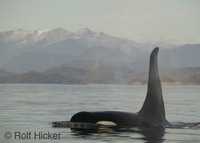Canadian government has recovery strategy for killer whales
Environmental groups in British Columbia changed their minds to sue the Canadian government after it released a recovery strategy for killer whales.

The Canadian plan calls for making sure that killer whales in Puget Sound and off Vancouver Island have an adequate and accessible food supply, reducing chemical and biological pollution, keeping human activities from disturbing the orcas and protecting their critical habitat.
The report promises more specifics within two years of the Ministry of Fisheries and Oceans accepting the plan.
Canadian environmental groups praised the strategy for identifying specific whale habitats that need protection.
"Without this important part of the strategy, the future of the species would have truly been in doubt," said Christianne Wilhelmson of Georgia Strait Alliance.
She said action can now be taken to address pollution, noise and human interference in identified whale habitats.
The Canadian strategy covers Puget Sound's southern resident orcas as well as threatened killer whales that spend most of their time north of Vancouver Island.
The U.S. government issued its own killer whale recovery plan in November 2006, after listing Puget Sound's resident killer whale population as an endangered species in November 2005.
The U.S. plan focuses on supporting salmon restoration, cleaning contaminated sites in Puget Sound, reducing pollution, evaluating and improving guidelines for vessel traffic in and around protected areas, preventing oil spills, and improving response plans should spills occur.
The National Marine Fisheries Service also designated critical habitat for the orcas: an area covering about 2,500 square miles, encompassing part of Haro Strait and the waters around the San Juan Islands, the Strait of Juan de Fuca and all of Puget Sound.
Subscribe to Pravda.Ru Telegram channel, Facebook, RSS!





